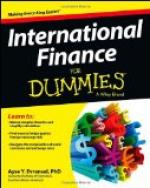All this is very obvious and very material, but international finance does much more, for it is a great educator and a mighty missionary of peace and goodwill between nations. This also is obvious on a moment’s reflection, but it will be rejected as a flat mis-statement by many whose opinion is entitled to respect, and who regard international finance as a bloated spider which sits in the middle of a web of intrigue and chicanery, enticing hapless mankind into its toils and battening on bloodshed and war. So clear-headed a thinker as Mr. Philip Snowden publicly expressed the view not long ago that “the war was the result of secret diplomacy carried on by diplomatists who had conducted foreign policy in the interests of militarists and financiers,"[4] Now Mr. Snowden may possibly be right in his view that the war was produced by diplomacy of the kind that he describes, but with all deference I submit that he is wholly wrong if he thinks that the financiers, as financiers, wanted war either here or in Germany or anywhere else. If they wanted war it was because they believed, rightly or wrongly, that their country had to fight for its existence, or for something equally well worth fighting for, and so as patriotic citizens, they accepted or even welcomed a calamity that could only cause them, as financiers, the greatest embarrassment and the chance of ruin. War has benefited the working classes, and enabled them to take a long stride forward, which we must all hope they will maintain, towards the improvement in their lot which is so long overdue. It has helped the farmers, put fortunes in the pockets of the shipowners, and swollen the profits of any manufacturers who have been able to turn out stuff wanted for war or for the indirect needs of war. The industrial centres are bursting with money, and the greater spending power that has been diffused by war expenditure has made the cheap jewellery trade a thriving industry and increased the consumption of beer and spirits in spite of restrictions and the absence of men at the front. Picture palaces are crammed nightly, furs and finery have had a wonderful season, any one who has a motor car to sell finds plenty of ready buyers, and second-hand pianos are an article that can almost be “sold on a Sunday.” But in the midst of this roar of humming trade, finance, and especially international finance, lies stricken and still gasping from the shock of war. When war comes, the price of all property shrivels. This was well known to Falstaff, who, when he brought the news of Hotspur’s rebellion, said “You may buy land now as cheap as stinking mackerel,” To most financial institutions, this shrivelling process in the price of their securities and other assets, brings serious embarrassment, for there is no corresponding decline in their liabilities, and if they have not founded themselves on the rock of severest prudence in the past, their solvency is likely to be imperilled. Finance knew that it must suffer. The story has




